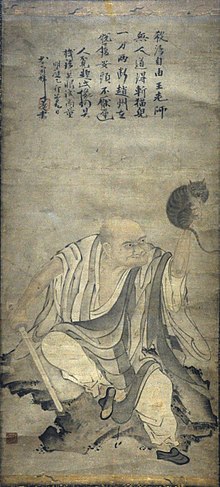Nanquan Puyuan |
|---|
 Case #14 of The Gateless Gate: "Nansen kills the cat" |
| Personal |
|---|
| Born | c. 749 |
|---|
| Died | c. 835 |
|---|
| Religion | Buddhism |
|---|
| School | Hongzhou school |
|---|
| Senior posting |
|---|
| Teacher | Mazu Daoyi |
|---|
| Predecessor | Mazu Daoyi |
|---|
| Successor | Zhaozhou Congshen |
|---|
Nanquan Puyuan (Chinese: 南泉普願; Wade-Giles: Nan-ch’üan P’u-yüan; Pinyin: Nánquán Pǔyuàn; Japanese: Nansen Fugan; Korean: 남천보원 Nam-cheon Bo-won) (c. 749 – c. 835) was a Chán (Zen) Buddhist master in China during the Tang dynasty.[1] He was the student and Dharma successor of the Master Mazu Daoyi (709–788).
Biography
In the year 795, after his enlightenment experience under Mǎzŭ, he settled in a self-made hut on Mount Nanquan, from which his dharma name is derived, and lived there in eremitic solitude for three decades.[2] In time, monks persuaded him to come down the mountain and found a monastery; from that time forward, he always had hundreds of students.[3]
Appearance in koans
Nanquan appears in several koans:
- 4 koans in The Gateless Gate (#14, #19, #27, #34),
- 6 koans in the Blue Cliff Record (#28, #31, #40, #63, #64, #69), and
- 3 koans in The Book of Equanimity (#9, #69, #91).
Two koans from the Blue Cliff Record (#28 & #69) depict Nanquan as an advanced student interacting with fellow students of Mǎzŭ, and the others depict him as a teacher in his own right.
A well-known koan is case #14 of the Gateless Gate, "Nansen kills the cat":
Once the monks of the eastern and western Zen halls were quarrelling about a cat. Nansen held up the cat and said, "You monks! If one of you can say a word, I will spare the cat. If you can't say anything, I will put it to the sword." No one could answer, so Nansen finally slew it. In the evening, when Joshu returned, Nansen told him what had happened. Joshu, thereupon, took off his sandals, put them on his head and walked off. Nansen said, "If you had been there, I could have spared the cat."[4]
Influence
Nánquán had seventeen Dharma successors, the most famous of whom was Zhàozhōu Cōngshěn (778–897).[5] Case #19 of the Gateless Gate recounts an interaction between Nánquán and Zhàozhōu that led to the latter having a profound realization; some translators/editors, for example Paul Reps, interpret this as Zhàozhōu's enlightenment moment.[6]
References
Wikimedia Commons has media related to Nanquan Puyuan.
| Main articles | |
|---|
| Doctrinal background | |
|---|
| Influential Sutras | |
|---|
| Teachings | |
|---|
| Practice | |
|---|
| Persons | | Classical Chan | |
|---|
| Modern Lingji | |
|---|
| Modern Caodong | |
|---|
| Modern Guiyang | |
|---|
| Traditional Zen | |
|---|
| Modern Rinzai | |
|---|
| Modern Sōtō | |
|---|
| Sanbo Kyodan | |
|---|
| White Plum Asanga | |
|---|
| German Zen | |
|---|
| Korean Seon | |
|---|
| Vietnamese Thiền | |
|---|
|
|---|
| Chinese Chán | | Historical sects | |
|---|
| Extant sects | |
|---|
| Contemperory Organizations | |
|---|
| Academic organizations | |
|---|
|
|---|
| Japanese Zen | | Historical sects | |
|---|
| Extant sects | |
|---|
| Lay organizations | |
|---|
| Academic organizations | |
|---|
|
|---|
| Korean Seon | | Historical sects | |
|---|
| Contemporary sects | |
|---|
|
|---|
| Vietnamese Thiền | |
|---|
| USA Zen | | Shunryū Suzuki lineage | |
|---|
| Kōdō Sawaki lineage | |
|---|
| Yasutani lineage | |
|---|
| Philip Kapleau lineage | |
|---|
| Other Sōtō lineages | |
|---|
| Soen Nakagawa lineage | |
|---|
| Other Rinzai or Linji lineages | |
|---|
| Pan-lineage | |
|---|
|
|---|
| European Zen | | Sanbo Kyodan | |
|---|
| Kōdō Sawaki lineage | |
|---|
| Other Sōtō lineages | |
|---|
| Zendo Kyodan | |
|---|
| Other Rinzai or Linji lineages | |
|---|
|
|---|
| Hierarchy and titles | | Novice | |
|---|
| Attendants | |
|---|
| Priest | |
|---|
| Teacher | |
|---|
| Institutional organisation | |
|---|
|
|---|
| Temples | | Main Sōtō Temples | |
|---|
| Main Rinzai Temples | |
|---|
|
|---|
| Zen literature | |
|---|
| Cultural influence | |
|---|
| Related schools | |
|---|
| Academic research | |
|---|
 Zen Buddhism Zen Buddhism- Zen Buddhists
- Zen texts

|


 Zen Buddhism
Zen Buddhism













